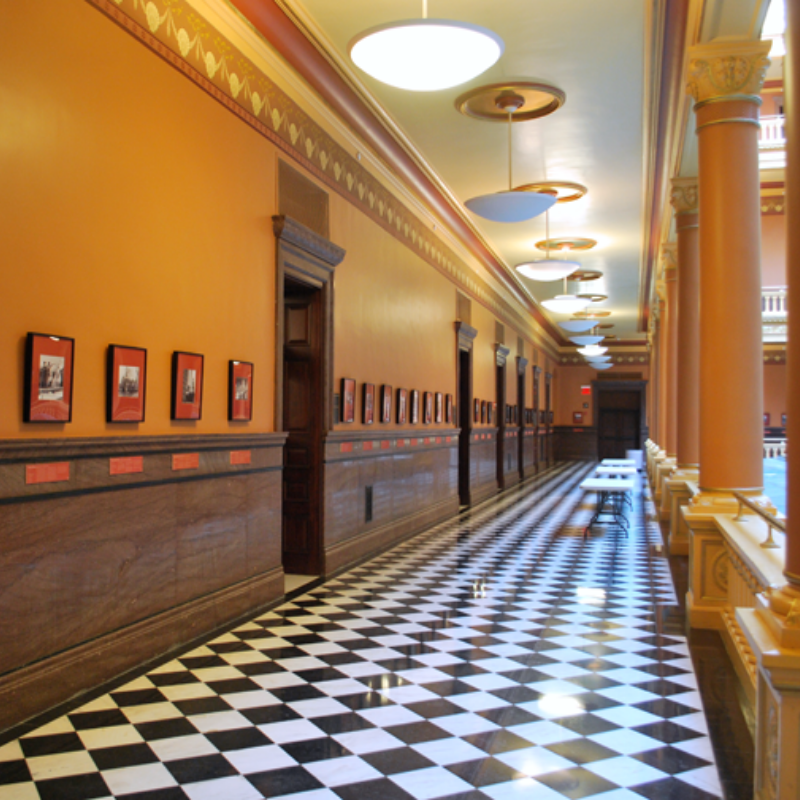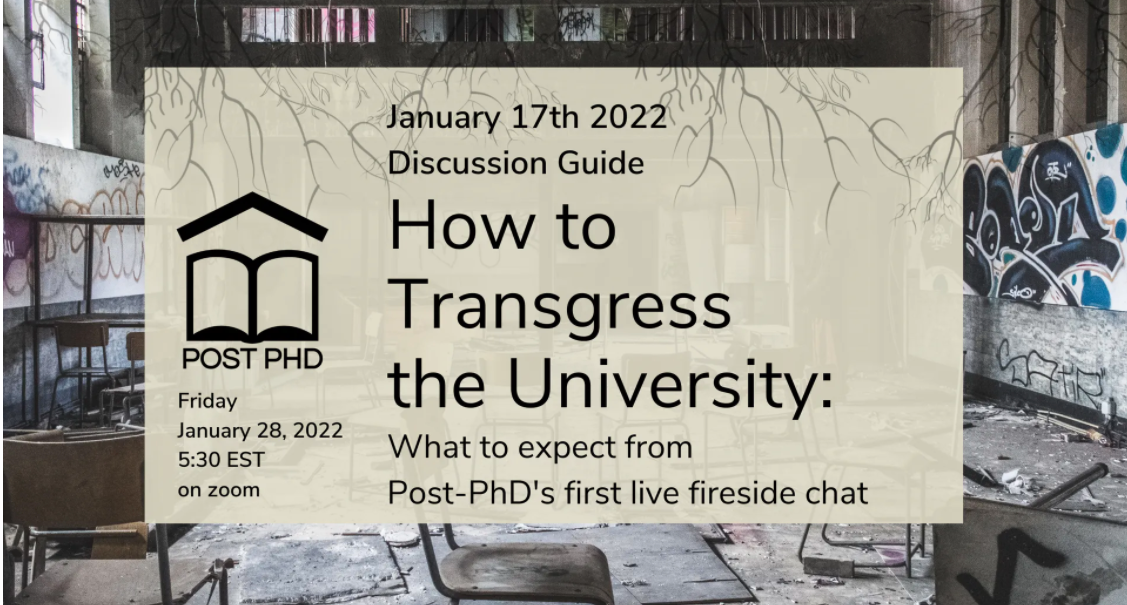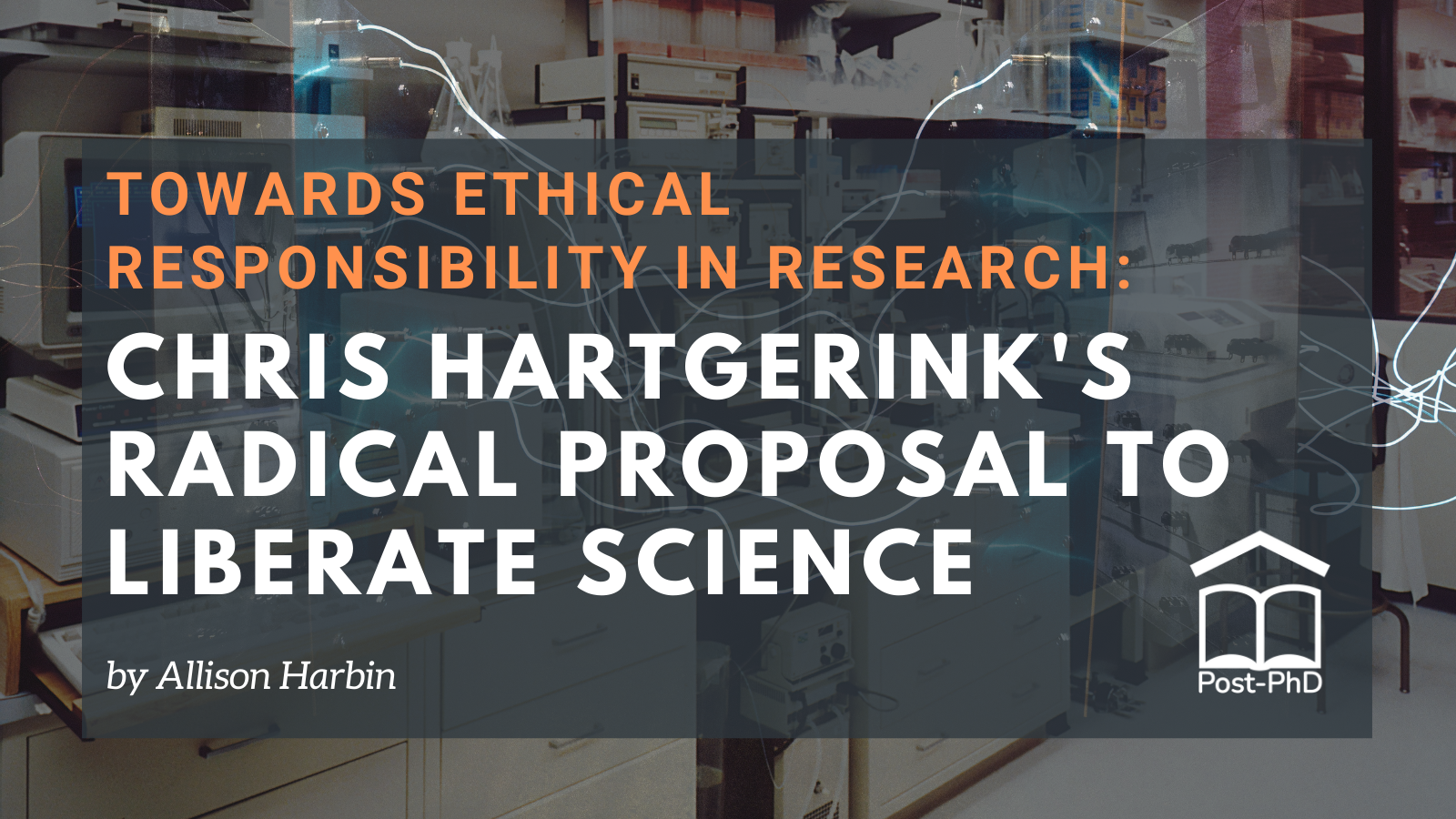
What would you do if a month before your PhD defense, your advisor had just published your work... under their name?
Welcome to my life circa 2017.
What did I do? Blew the whistle, losing any hope of an academic career for holding people accountable.
But the stakes quickly became larger than the loss of my own academic career. Antonia Cundy, for the London Financial Times, writes, Harbin’s experience demonstrates that exploitation in higher education is systemic and that “even in the best of circumstances, even if you’re a decent person, you’re incentivized to steal from your students.”
Post-PhD began to document my fallout but has evolved into a space for important dialog and discussion that neither the Chronicle nor Higher Ed Times (let alone a department newsletter) would touch.
To follow along with the misadventures of Post PhD, subscribe to my free newsletter: Not Safe for School.
Follow me on twitter: @postphdtheblog
Most-Read Posts:
In this post: I talk about being served with a lawsuit by my former advisor, alleging conspiracy and defamation in response to my Why I Left Academia blog posts.
In this post: I talk about my former department's response to my blog and what it has shown me about the toxicity of academic culture.
In this post: Part three of Why I Left Academia. About what happens in the aftermath of intellectual trauma.
In this post: I talk about the moment I knew I was done with academia and the events before defending my dissertation.
What Post-PhD is about:
I shared my painful story out of a strong sense of solidarity with those who have been victimized, exploited, and traumatized from their experiences in toxic work environments. Read these posts here.
Sparking Conversations about Structural Inequity in Education
Before we can address solutions to the crisis in education, we have to arm ourselves with resources for the resistance: knowledge. Read posts addressing how to resist and fight for change in education here.
Interviews and Collaborations with Inspirational People (alt-ac realness)
The more of my own story I shared, the more I connected with my readers and academic communities from New Zealand, Berlin, Canada and more. This section also includes interviews with alt-academics, current professors, and authors. Read them here.
Support overdue exits from academic (and other unsolicited academic advice)
This section began as emails flooded my inbox asking what to do, many were in crisis or already embroiled in a lengthy battle with either their departments or universities. Read these posts about how to advocate for yourself and fight for the future of education here.
“Thank you so much for sharing your story. While I have not yet had an experience like yours, I believe you may have saved me from a certain naivety that would have led me down a similar road. I am extremely saddened for your loss, but I am also grateful to you for allowing people like me to gain an understanding of the grim realities of academia without having to suffer them first.”
“Post-PhD is not just a personal narrative, but something much larger that all of its readers help create everyday. It’s both a testimony and battle cry to burn it down.”
“Binge read this blog!!! I stumbled across Post-PhD last night and by this morning I’ve read most of its archive. I certainly can’t say I’ve ever been so captivated by a blog before.”
Full Archive of Post-PhD by Allison Harbin:
2017-2022
Scroll through posts by pressing the arrow in the upper-left of the sections below. Or, click the button below to see a list of all the posts.
Section One: Why I Left Academia
In this post: The real story of what happened after I left academia, on the loss of my academic career and feeling adrift.
In this post: I talk about what I've learned about how to exist as an educator and how to extend that beyond the context of academia.
In this post: I talk about the consequences of my academic relapse and how academia shapes us.
In this post: I talk about professor salaries and the declining availability of tenue positions within the university in relation to money allocation.
In this post: I talk about my role as a polarizing figure in academia, and the story of the day I decided not to remove my posts.
In this post: A retelling of my day in court and what I learned.
In this post: I talk about the emotional toll all of this has had on my mentality and life in general, and how despite all of that I'd do it all over again.
In this post: I talk about the immense value to be found in the pursuit of knowledge and the importance of the project of academia.
In this post: I talk about being served with a lawsuit by my former advisor, alleging conspiracy and defamation in response to my Why I Left Academia blog posts.
In this post: I talk about my former department's response to my blog and what it has shown me about the toxicity of academic culture.
In this post: Part three of Why I Left Academia. About what happens in the aftermath of intellectual trauma.
In this post: Part two of Why I Left Academia. About my attempts to follow procedure and how institutional procedure protects aggressors instead of students.
In this post: I talk about the moment I knew I was done with academia and the events before defending my dissertation.
Section Two: Essays on Systemic Problems in Education
In this post: I list sixteen PDFs on different topics including pedagogy, Why We Teach as a Practice of Freedom, Teaching to Transgress in Real Life and the Pedagogy of Lesbian Feminism.
In this post: I talk about career transitions from academia to beyond and having to realign your identity, values, and process.
In this post: Activist pragmatism, the undercommons, and the task of the subversive intellectual today. I talk about scholars featured in the upcoming "resources for the resistance" post.
In this post: A brief annotated bibliography featuring my receipts for the January 2022 essay "What is the Subversive Intellectual," recommendations, and further reading.
In this post: An introduction to Post-PhD's new resources and community dialog and how to engage with our discourse.
In this post: A growing list of peer-reviewed essays, books, and articles addressing neoliberal policy in higher education driven by the need to know how the university got here.
In this post: As Fred Moten and Stefano Harney make clear: the only ethical relationship to the university today is a criminal one.
In this post: I talk about the revelatory impact of Bell hooks' Teaching to Transgress and how it taught me how to be a fully engaged educator.
In this post: Society tends to hate women, and the maddening experience of being victim-blamed, being gaslit, and having your experiences trivialized.
In this post: What is culturally responsive pedagogy? How do you decolonize the classroom? On the importance of refined critical thinking skills.
In this post: I talk to a friend of mine from graduate school and asked her what the most enraging thing a professor told her was, and her response was worse than I could've imagined.
In this post: It's too late to save education, and it has been since the 1970s. In this post, I explain why in the context of neoliberal policy and deregulation.
In this post: Academia is no meritocracy. Neoliberal ideology-driven competition turns us into fools, shame on us.
In this post, I talk about my evolution as a person both through and beyond my PhD in art history, why the concept of the “canon” is racist and sexist since the grant majority of “canonical” artists are but white and male. And how Kimberle Crenshaw's "intersectional feminism" is the only canon I answer to. Screw Paul Gauguin.
In this post: I talk about the hilarity of this week's admissions scam and how it sheds light on the concept of educational privilege and its abuses.
In this post: Theorist of race and gender Kevin Allred shares his story of how a classroom exercise about free speech got him arrested.
In this post: I talk about recognizing the meritocracy of academia as a myth, and what it allows us to step back and see.
In this post: I talk about the need for discussion about adjunct and graduate student exploitation and false promises.
This is a post about how systemic the abuse and exploitation of adjuncts and graduates students is: Know if this is happening to you, or in your department, you are not alone.
In this post: About the toxic culture of academia and its perpetuation of systemic abuse, my expulsion from academia, and what I came to find when I left.
In this post: If academia is a place where professors can take, without consequences, the work of graduate students to claim as their own, what does this say about the future of academia?
In this post: A cold dose of reality demonstrating academias failure to be the meritocracy we all thought it was.
Section Three: How to Leave Academia (and other unsolicited advice)
In this post: A reflection on the UCU strikes, past and upcoming content, and what the f*ck we are supposed to do with all this mess, including a list of what I'm reading.
In this post: I talk about career transitions from academia to beyond and having to realign your identity, values, and process.
In this post: I am posing the most common concerns this month to an impressive cast of alt-academics, current professors, post-docs, and graduate students to join Post-PhD in a live fireside chat.
In this post: This January's reading list, a fully annotated bibliography including racial pedagogy and foundational critiques of higher education.
In this post: I pose a discourse about the adjunct crisis, and the larger systemic educational crisis we are currently in, and ponder on the differences our generation of thinkers can make for the next.
In this post: As Fred Moten and Stefano Harney make clear: the only ethical relationship to the university today is a criminal one.
In this post: Dr. Caitlin Faas and I go over wtf it means to be both "embodied" and "reduce stress," and how to know your limits while staying productive.
In this post: I write about the satisfaction beyond academia, and how to continue to embody the principles ad methods you honed in academia in the real world.
In this post: I get real about the jobs I tried to get in my transition to alt-ac and Post-PhD. Let's talk about the jobs I tried to get, how little I was paid, ad what I learned from that experience.
In this post: I cover my plenary talk at the Reward Equator Conference in Berlin. I also include an amazing collection of engaged scholars I've found who are dedicated to supporting Ph.D. researchers.
In this post: For the love of pedagogy, I discuss my role as a professor and a teacher in NYC, and how there is zero incentive for educators to care about their students.
In this post: It's been eighteen months since I left academia, here's what I learned in my recovery.
In this post: I talk about my dissociation from the legal drama I was put through, and what it teaches me when it rears its ugly head.
In this post: I talk about the gradual growth of my editing and writing client base and the happiness I've found in learning the ropes of business writing, web copy, and content writing.
In this post: I talk about academic fragility and its role in maintaining the status quo, and the difficulty of entering a career field without being well-versed.
In this post: I respond to those asking what's happened since I left academia and the psychological and practical difficulties in leaving.
In this post: Job opportunities for Ph.D. students from someone who has obsessively researched her own options after leaving academia.
In this post: I discuss the difficulty of leaving academia and the importance of strategic thinking and embracing the unknown when it comes to the next step in career moves.
Section Four: Interviews, Collaborations, and other Alt-Ac Realness
In this post: Dr. Tashima Thomas gives Unsolicited Academic Advice on trusting yourself, your methodology, and finding your tribe.
In this post: Author and activist Jessie Daniels joins us to talk about dismantling white supremacy, leaving academia, and more.
What does it mean to unite praxis with practice when you are a radical academic? Shuttleworth fellow Chris Hartgerink's plan to Liberate Science through organic networks of exchange and a bottoms-up approach to research challenges the status quo of the scientific publishing oligarchy. In line with Open Access proponents, Hartgerink seeks to go even further.
In this post: I review former academic turned novelist Amy Gentry's latest thriller "Bad Habits" and its reminder of the crucial role of imagination.
In this week's post, Jillian and I's interview turns to talk about applying for jobs post-academia, the struggles of being a PhD in the business space, as well as the invaluable insights a mind trained by a PhD rigor offers.
I love this post because Jillian makes no apologies for her desire to make a comfortable living (and, gasp, even a 401k!) despite her hatred of capitalism. Yeah, they're conflicting objectives, but life itself cannot be reduced to simplistic binaries of either/or. Similarly, the life Jillian has constructed for herself appears to be an "and, and" situation, where she pursues social issues that matter to her-- such as her forthcoming book about adjuncting and her social engagement class that she teaches, alongside a burgeoning career as a consultant in market research.
In this post: Dr. Jillian Powers provides us with invaluable insights a mind trained by a Ph.D. rigor offers.
In this post: Theorist of race and gender Kevin Allred shares his story of how a classroom exercise about free speech got him arrested.
“Your blog has been a sharp wake up call to me. I know I have an enormous fight ahead of me, and oddly, reading stories of appalling treatment in academia the world over has helped me process the brutal truth that this will get worse before it gets better.”




























































In this post: A retelling of my day in court and what I learned.